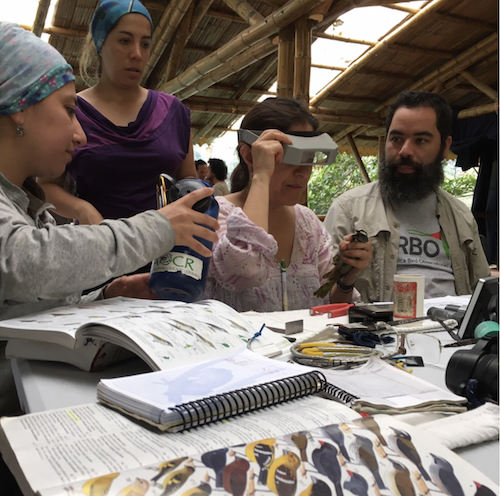For nearly 20 years, IBP has been working with partners across Latin America and the Caribbean to help conserve birds through their full annual cycle. Most of this work is accomplished through the Monitoring Overwinter Survival (MoSI) program and its affiliated conservation organizations from northern Mexico to Argentina.
With the help of the U.S. Fish and Wildlife Service, IBP has launched a new initiative to connect conservation organizations at both ends of the annual cycle. Through a series of partnerships, we are bringing together local groups in the U.S. Upper Midwest (Illinois, Indiana, Iowa, Michigan, Minnesota, Missouri, Ohio, and Wisconsin) and Latin America where many North American breeding birds winter – people working to protect the same birds at different times of the year.
Local and state Audubon chapters, birding groups, zoos, and state wildlife agencies will play a central role in this project.

IBP, the Klamath Bird Observatory and the Costa Rica Bird Observatory held a MoSI and bird banding training in Ecuador in 2018. Pictured are (left to right) Nadia Palvata, Gabriela Toscano, Tatiana Santander, and Pablo Elizondo, Executive Director of CRBO. Photo by Steve Albert.
The MoSI Connection
We all understand the need to protect birds through their full annual cycle, which is why IBP established a network of research and monitoring stations across the tropics – the MoSI program – in areas where North American breeding birds spend up to eight months of the year. Without collaborating partners in these countries, conservation efforts face a much tougher battle.
IBP works with nearly 100 conservation partners from Mexico to Argentina to study and protect migratory birds on their wintering grounds. Latin American conservation professionals face many challenges, including a lack of financial resources. We believe establishing partnerships with North American conservation groups will help under-resourced Latin American conservationists achieve their goals while also providing tangible benefits to North American partners.
Connecting Birds and People
Support for the program is taking many forms, such as collaborative research on shared species, providing bird banding supplies, cash grants, and birding and ecotourism visits to project sites. We have gotten the program off to an amazing start with three Minnesota-based Audubon chapters:
-Minneapolis Audubon is supporting a new MoSI station at Zamorano University in Honduras
-Saint Paul Audubon Society is supporting the Runaway Creek MoSI station in Belize
-Zumbro Valley Audubon Center will be supporting two MoSI stations in Guatemala
In addition, Audubon chapters and birding groups in Ohio, Indiana, Wisconsin, and Illinois have expressed interest in participating.
This program is partly built on the successful partnership established between North Carolina Audubon and the El Jaguar Reserve in Nicaragua. Audubon sponsorship helps keep two MoSI stations running, and supports collaborative research on Golden-winged Warbler and other species. In addition, Richland Center, Wisconsin has been a sister city of Santa Teresa, Nicaragua since 1987 and currently supports a MoSI station at the Chacocente Reserve.
A relatively modest level of support can make a big difference to the partners in Latin America. We hope that these new relationships will last for many years, providing benefits to all partners and helping to conserve the birds we all treasure.
For more information about this program, please contact Steve Albert or Lauren Helton.






